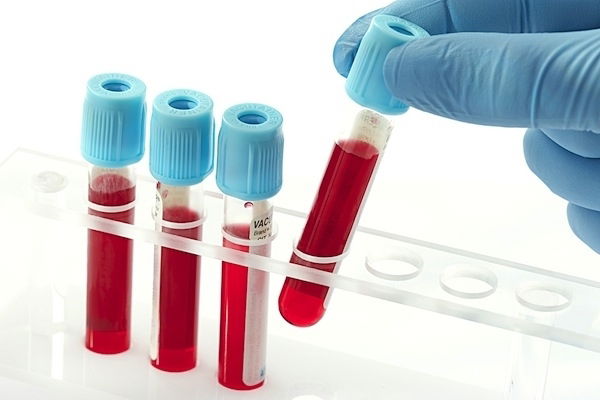Thyroid tests can help doctors to assess thyroid functioning and to determine whether there are any abnormalities present in the thyroid, like changes to size or the presence of tumors.. Some thyroid tests, like TSH, free T4 and T3, can also help to guide treatment by giving the doctor a parameter for thyroid medication dosing. Image tests, like a thyroid ultrasound, can help detect nodules that are impairing thyroid functioning.
More specific thyroid tests, like scintigraphy, a biopsy or antibody levels, can be ordered to determine certain diseases like thyroiditis or thyroid tumors. Read more about symptoms of thyroid problems that may occur if this gland is undergoing a disease pathology.
If you suspect that you may be having a thyroid issue, you should consult your family doctor or endocrinologist, who may order thyroid tests to evaluate the thyroid gland and its functioning.

List of thyroid tests
The thyroid tests that are most commonly ordered are:
1. T3 and T4 levels
T3 and T4 are hormones that are produced by the thyroid, and measuring their levels in the blood can be beneficial for assessing thyroid function. These levels can become altered with hypothyroidism or hyperthyroidism.
T3 and T4 are needed to regulate energy expenditure and stimulate cell metabolism. Read more about the T3 test and what results mean.
2. TSH levels
TSH is a hormone produced by the pituitary gland, a gland located in the brain, which regulates thyroid functioning and stimulates the production of other hormones, such as T3 and T4.
This hormone can be measured in the blood and its levels are generally altered in cases of hypo or hyperthyroidism, use of some medications and tumors,. Read more about the TSH blood test and what results can mean.
3. Anti-TPO levels
The presence of antiperoxidase antibody (anti-TPO) in the blood can impact thyroid function. High levels may be a sign of autoimmune disease like Hashimoto's thyroiditis and Graves' disease.
4. Anti-Tg levels
Anti-thyroglobulin (anti-Tg) antibodies may be present in the blood in some people, especially in those with of autoimmune thyroid diseases like Hashimoto's thyroiditis and Graves' disease. However, its presence in the body is not always considered a problem, and it is important that reuslts are evaluated together with the results of other thyroid tests.
5. Anti-TSH receptor antibody
The anti-TSH receptor antibody (anti-TRAB) is an antibody that can stimulate thyroid function. This is often ordered to confirm the diagnosis of Graves' disease.
6. Thyroid ultrasound
A thyroid ultrasound is ordered to evaluate the size of this gland and to detect changes like cysts, tumors or nodules. Although this test is unable to confirm cancer, it may be useful to detect characteristics of cancer. This test can prompt a thyroid nodule or cyst puncture to guide treatment.
7. Thyroid scintigraphy
A thyroid scintigraphy, or thyroid scan, is a test that uses a small amount of radiactive iodine and a special camera to generate a thyroid image. It helps to idnetify the level of activity in the gland.
This test is mainly ordered to investigate suspicious nodules, cancer or hyperthyroidism secondary to a nodule.
8. Thyroid biopsy
A thyroid biopsy or puncture and ordered to determine whether a nodule or cyst in the thyroid is benign or malignant. During this test, the doctor inserts a thin needle in the nodule and removes a small amount of tissue or fluid within the nodule for lab analysis.
A thyroid biopsy can hurt or cause discomfort because this test is not done under local anesthesia. The doctor may need to move the needle around during the exam to collect sufficient specimen in parts of the nodule or to aspirate most of the fluid. A thyroid biopsy is generally quick in takes about 10 minutes. Patients should keep the dressing over the area for several afters after.
9. Thyroid self-exam
A thyroid self-exam can be used to identify the presence of cysts or nodules in the thyroid. If lumps are detected in an early phase, it can prevent disease-related complications. This self-exam should be done my women over 35 or if patients have a family history of thyroid problems.
A thyroid self-exam can be done by:
- Standing in front of a mirror and determine where the thyroid is located. Is typically found directly under the Adam’s apple.
- Tilting the head back to better expose the area.
- Drinking a sip of water.
- Assessing thyroid movement and determining whether there is any asymmetry or protrusions.
If thyroid abnormalities are noted, you should see your family doctor or an endocrinologist for testing to confirm whether thyroid disease is present.
When thyroid tests are ordered
Thyroid tests are recommended for patients over 35, for patients with a family history of thyroid changes, pregnant women or women looking to become pregnant.
Testing may also be indicated following radiation treatment for neck or head cancer, or during treatment with medications like lithium, amiodarone or cytokines, which can interfere with thyroid functioning.






























